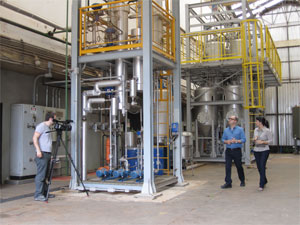 In the seventeenth episode of the Horizons series, presenters Adam Shaw and Saima Mohsin take a closer look at a new generation of energy crops in Brazil and the United States, where companies are using plant biomass and single celled plants or algae to produce fuel.
In the seventeenth episode of the Horizons series, presenters Adam Shaw and Saima Mohsin take a closer look at a new generation of energy crops in Brazil and the United States, where companies are using plant biomass and single celled plants or algae to produce fuel.
At some point our traditional sources of power such as coal and oil will run out and there is an increasing need to find alternatives. Turning plants into power is one option. Currently more than 80 million hectares of land are planted for bio-fuels including sugarcane, corn, palm oil and beets.
By 2050, if we’re to power the globe’s projected fleet of vehicles by biofuels, we would need to deploy more than 650 million hectares of arable land. That’s an area nearly the size of Australia.
First, Adam Shaw heads for the Cane Technology Centre in Piracicaba in Southern Brazil, an area forming part of the largest sugarcane growing region in the country. They’re now breaking down sugarcane waste or bagasse to produce bioethanol. The challenge is to digest cellulose – the tough cell walls of green plants - and turn it into useful sugars. It is a difficult, complex process both mechanically and chemically and they’re looking to scale up production in a few years.
Jaime Finguerut, Industrial Strategic Development, Cane Technology said:“We could grow not just horizontally but vertically, extracting more ethanol from the same sugarcane, like petroleum going deeper looking for oil, we are going deeper into the structure seeing where we can get more sugar.”
Saima Mohsintravels to San Francisco in the United States to look at so-called “third generation bio-fuels”, which are made from single-celled plants or algae. Solazyme is working with Chevron, Honeywell and United Airlines to develop biofuels using genetically modified algae that feed off plant sugars in tanks. Bringing the cost down, while ramping up production is going to be crucial.
The company has been awarded a contract by the U.S. Department of Defence to supply 550 thousand litres of bio-diesel made from genetically modified algae and opened its first commercial facility, with funding from the U-S Department of Energy.
Harrison Dillon, Chief Technology Officer, Solazyme said:“The way the process works is these algae will eat plant material, like sugarcane or waste biomass and rapidly and efficiently convert that plant material directly into crude oil.
And once we have that crude oil we can then turn it into diesel fuel, jet fuel, or any oil-based product.”
The Horizons series, sponsored by DuPont, airs weekly on BBC World News on Saturday 7.00am & 2.00pm and Sunday 8.00pm and 1.00am.
Comments are closed.